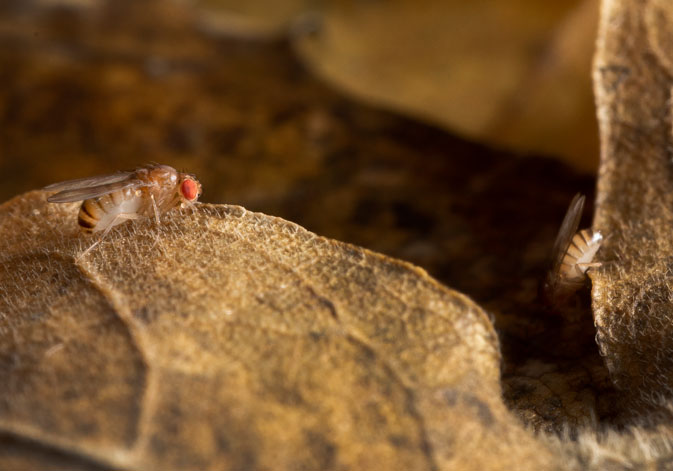
Researchers of the Cavanilles Institute of the Universitat de València have proved that the physiological damages of sexual frustration can accelerate the evolution of the species. In a work recently published in the prestigious magazine Proceedings of the Royal Society B: Biological SciencesDrosophila melanogaster.
This discovery entails a big step to understand the factors that adjust sexual selection, which is an important evolutionary driving force to understand the viability and adaptability of natural populations.
The study proves that in the case of the vinegar fly (Drosophila melanogaster) the sexual frustration accelerates the reproductive ageing. When the male of this specie detects the presence of a female, the physiological mechanisms that prepare him to compete against other males and reproduce are set in motion. Nonetheless, if a male that constantly notices the presence of reproductive females is not able to reproduce frequently (for instance, because of the presence of other males) the frustrated prospects have collateral negative consequences: these males age much faster and their reproductive success is drastically reduced (approximately 25%).
“At human scale, this means losing 8 years of life and having one descendant less out of 4”, says the head researcher Roberto García-Roa. “These disadvantages basically affect the worst males of a population, those who already have more difficulties to reproduce, and therefore the evolution will drastically favour better males. In this sense, sexual selection will be intensified because it accelerates the evolution of any trait that allows males to be better competitors.
Although this has been studied only in a few species so far, the physiological mechanisms of this type of ageing seem to be well-preserved, which could mean that it is a widespread phenomenon in other animals.
An essential issue of evolutionary biology is determining the intensity of Darwinism. “It is crucial to explain how populations achieve to adjust their genes to the environmental conditions, and how the genetic separation between different populations takes place and leads to the appearance of new species”, assures Manuel Serra, head researcher of the project and professor of the Department of Microbiology and Ecology.
“Thanks to Darwin, we understand that selecting a trait depends on the advantage that it gives to the carrier in terms of survival and reproduction in relation with its competitors. In species that have sexual reproduction, this advantage lies on the priority access to reproduction, a process which is called sexual selection”, points out Serra. In addition, he indicates that “this is the explanation for extravagant traits in some males that are attractive to females or permit that some males fight and defeat others. Deer antlers or the bright colours in many birds are paradigmatic examples of these attributes.
“Apart from being one of the main mechanisms of evolution, the sexual selection can have positive consequences in populations by increasing its visibility and capacity to adapt to a changing environment”, indicates Pau Carazo, head researcher of the project. Understanding which factors regulate the sexual selection is essential to answer basic questions of evolutionary biology such as why genders age differently or what are the advantages of sexual over asexual reproduction.
Article:
Roberto García-Roa, Manuel Serra and Pau Carazo: «Ageing via perception costs of reproduction magnifies sexual selection», Proceedings of the Royal Society B: Biological Sciences








